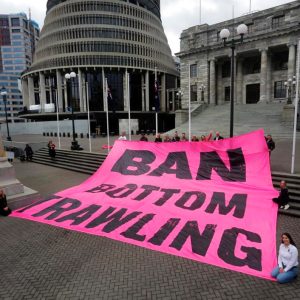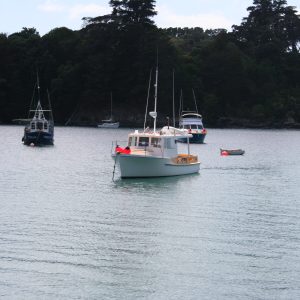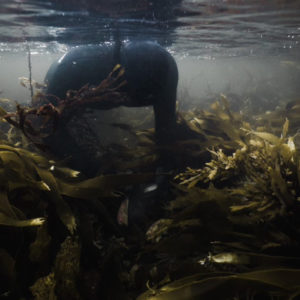“Oh! What a tangled web we weave, when first we practice to deceive”, Sir Walter Scott, 1808.
This quote refers to how complex life can get if you don’t tell the truth. It is derived from a play about a love triangle and yet it is so applicable to what is happening in fisheries circles right now.
There’s been no love lost lately but plenty of credibility has gone down the gurgler since the Heron report was released in mid-September.
Michael Heron QC spent three months looking into three compliance operations and the reasons why MPI decided not to prosecute trawler crews filmed dumping up to 100% of their catch of quota fish.
When the story broke in May Ministry for Primary Industries’ officials initially dismissed the accusations of a cover-up. By June officials admitted they did not have sufficient evidence for a prosecution. Not long after MPI officials claimed they had received a legal opinion that the evidence they held was insufficient to pursue a prosecution. In September MPI accepted the information they received was wrong.
The Heron report notes the poor internal processes and decisions made by MPI in regards to several Operations, Achilles, Overdue and Hippocamp. The decision not to prosecute offenders identified during Operation Achilles was considered “flawed”. More relevant guidelines, simpler processes and documentation were recommended for future use.
What does all this mean?
Firstly, thanks again to all those supporters that helped raise awareness about fish dumping and senseless waste during the 2013 Save Our Snapper campaign.
In 2013 the Minister insisted on 100% observer coverage of trawl and Danish seine boats in the Snapper 1 fishery, between North and East Cape. It may be an inconvenience for commercial fishers who are following the rules, but it ought to contribute to reducing the wastage of snapper and other species from the rest of the fleet.
In 2013 many of the submissions from fishing companies claimed that all their catch was recorded and that increasing recreational catch was undermining the Quota Management System. Not so, given the testimony revealed in the Heron report. Dumping is common in some commercial fisheries.
Dumping by commercial fishers not only means their catch goes unrecorded, but it also puts a bias on commercial catch rates used in stock assessments, because only landed catch is applied.
It is rather ironic that these latest revelations elevate the importance and reliability of the much-maligned National Panel Surveys used to estimate recreational harvest. Those estimates could be as good, or better, that the self-reported commercial catch for some species. So any talk of “unknown” recreational catch can be dismissed.
Another interesting point is the confirmation of all the talk around dumping, and the feelings of MPI managing fisheries with a strong bias towards the commercial industry. To the extent that we now learn that corporate fishing interests have succeeded in winning the contract to monitor themselves, in the hope of detecting at-sea offending with the use of cameras.
After all the huffing and puffing about transparency and new processes we are facing a future where the commercial fishing industry is allowed to watch themselves on video and tell MPI if they detect anything illegal. Isn’t this just the fox in charge of the henhouse?
That henhouse is a multi-billion dollar operation based on mining our national resource, our fish. Having Trident Systems, which is 43% owned by Sanford, the largest commercial fishing company in the country, in control of surveillance does not fill the heart with love or joy.

Fishing is a Kiwi tradition
For many Kiwi families fishing is their favourite pastime, an opportunity to put healthy food on the table, and their second biggest investment – in their boat.
Over time recreational fishing experiences have changed up and down the country. Fishing has become steadily harder, the fish are smaller and some species are no longer available in the places we fish.
Commercial fleets have arrived in various sizes and are deploying all manner of industrial fishing techniques into the inshore environment, where we fish.
There is less fish to catch and yet the industrial fishing pressure never seems to let up!
When the original story came to light in May there was much anticipation that the publicity around non-compliance by industrial fishers would finally lead to changes in both behaviour and management, so that our fish stocks could recover to abundant levels.
It is now depressing to see that all the government and MPI are prepared to do is search for a carpet big enough to sweep all the problems under. Out of sight, out of mind.
LegaSea is one of many voices demanding a full and proper inquiry into industrial fishing and the Quota Management System in which these fishers operate.
That is because we are all sick of walking around the huge mound in the carpet where all the lies and corruption are hidden. The best treatment is to pull the carpet back and subject the whole smelly mound to bright sunlight.
We’re saying, never mind the puffery let us see what’s really happening and the scale to which our precious inshore fisheries are being mistreated.
Unfortunately MPI seems to have convinced Cabinet that all will be resolved when the fisheries system review is completed. Yet that review has been underway since 2015.
We can already guess that the review will be framed to try and claw back some credibility for MPI. All the Ministers have to do now is stall for a couple of months while the Ministry tinker with their proposals so that fishing industry approval is granted.
LegaSea urges all concerned Kiwis to vote in the poll: Do you support LegaSea’s call for a Commission of Inquiry?
Please, sign up to the LegaSea Legends programme. Please commit to doing your bit to rebuild our inshore fisheries.
Our collective success will lie in the ability of Kiwi families to continue fishing together. And the last thing we want is to be forced into telling a web of lies about our fishing prowess to our grandchildren, because inevitably liars are shamefully exposed.





